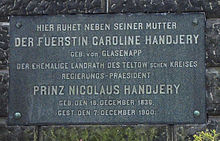Nicolaus Prince Handjery
Nicolaus Prinz Handjery (born December 18, 1836 in Constantinople , † December 7, 1900 in Dresden ) was a Prussian politician.
Life
Prince Handjery was the son of the Russian civil servant Prince Telemach Handjery and his wife, the German nobleman Caroline Handjery, née von Glasenapp . His grandfather was Alexander Hangerli , a phanariotic Greek dragoman of the Ottoman Empire and briefly Prince of the Principality of Moldova . When Handjery was nine years old, his family moved with him to Dresden and later to Berlin . His father bought the Ulenburg , Beck , Schockenmühle and Gohfeld estates in Westphalia . In 1850 the father died. On April 17, 1851, Handjery received the naturalization certificate (citizenship). On April 21, 1851, he put on Friedrich-Wilhelms-Gymnasium in Berlin High School from where he extensive knowledge of geography and history , as well as in the languages of Latin , Greek and French showed. From 1854 to 1857 he studied law in Berlin and Bonn and on June 20, 1857 received the degree of Dr. iur. utr.
From 1857 to 1861 he served in the Guard Cuirassier Regiment and retired for health reasons with the rank of Second Lieutenant .
From 1861 to 1863 he was an auscultator at the Berlin Supreme Court . On June 26, 1863, he was appointed court trainee. Handjery then traveled to France for a year . After his return, he passed the government trainee exam in Potsdam on May 28, 1864, and was accepted into civil service on June 11. On October 29, 1867 he passed the Great State Examination in law and was then appointed government assessor on November 25, 1867 . From December 1867 to March 1868 he took over the representation of the district administrator of Jüterbog-Luckenwalde . In the same year he took over the representation of the district administrator of the district Teltow . From 1868 Handjery worked in the Ministry of Agriculture, Domains and Forests , from 1869 as a government assessor in the Royal Police Headquarters in Berlin. From April 1868 to January 1874 he represented the constituency of Potsdam 10 Teltow - Beeskow - Storkow in the Reichstag .
On July 1, 1870, he took over the provisional administration of the Teltow district. From 1870 to 1876 he was also a member of the Prussian House of Representatives . In 1877 Handjery was appointed royal chamberlain. From 1879 to 1882 he was again a member of the Prussian House of Representatives. From December 1884 to March 1885 he was chairman of the Brandenburg Savings Bank Association. On March 16, 1885 Handjery was appointed regional president of the Liegnitz administrative district in the province of Silesia .
On April 1, 1895, the then 58-year-old was released from civil service.
He died in Dresden in 1900 and was buried in the St.-Matthäus-Kirchhof in Schöneberg near Berlin, in a hereditary burial on the east wall of the cemetery, which he himself acquired after his mother's death in 1879 (field H-OE-016 / 019).
Honors
- Landwehr Service Award, Class II (May 8, 1872)
- Red Eagle Order IV Class (July 28, 1875)
- Order of the Red Eagle III. Class with Ribbon (January 18, 1887)
- Red Eagle Order II Class with Oak Leaves (March 23, 1890)
- Franz Joseph Order (September 19, 1890)
- Commander Order of King Albert of Saxony I Class (September 30, 1890)
- Star for the Order of the Red Eagle, Class II with Oak Leaves (March 11, 1895)
In his former district, Handjerystraße in Berlin-Friedenau and Berlin-Adlershof as well as Prinz-Handjery-Straße in Berlin-Zehlendorf are named after him. In Berlin-Neukölln there was also a Prinz-Handjery-Straße from before 1877 until the name was changed to Briesestraße in 1950 .
literature
- Claudia Wilke: The district administrators of the Teltow and Niederbarnim districts in the German Empire . Potsdam 1998, ISBN 3-930850-70-2 .
Web links
- Prince Handjery, Nicolaus in the database of members of the Reichstag
- Biography of Nikolaus Prinz Handjery . In: Heinrich Best : database of the members of the Reichstag of the Empire 1867/71 to 1918 (Biorab - Kaiserreich)
Individual evidence
- ↑ Prince Nicolaus Handjery (1836-1900). Retrieved May 3, 2018 .
- ^ Fritz Specht, Paul Schwabe: The Reichstag elections from 1867 to 1903. Statistics of the Reichstag elections together with the programs of the parties and a list of the elected representatives. 2nd Edition. Carl Heymann Verlag, Berlin 1904, p. 37.
- ↑ Bernhard Mann (edit.): Biographical manual for the Prussian House of Representatives. 1867-1918 . Collaboration with Martin Doerry , Cornelia Rauh and Thomas Kühne . Düsseldorf 1988. Droste Verlag, p. 166 (handbooks on the history of parliamentarism and political parties, vol. 3)
- ↑ Hans-Jürgen Mende: Alter St. Matthäus-Kirchhof Berlin. A cemetery guide . 3rd, revised and expanded edition. Edition Luisenstadt, Berlin 2012, ISBN 978-3-936242-16-4 , p. 12.
| personal data | |
|---|---|
| SURNAME | Handjery, Nicolaus Prinz |
| ALTERNATIVE NAMES | Handjery, Nicolaus Prince of |
| BRIEF DESCRIPTION | Prussian politician, MdR |
| DATE OF BIRTH | December 18, 1836 |
| PLACE OF BIRTH | Constantinople |
| DATE OF DEATH | 7th December 1900 |
| Place of death | Dresden |
